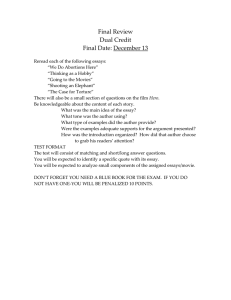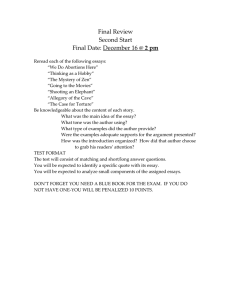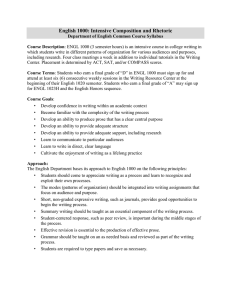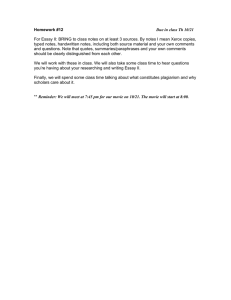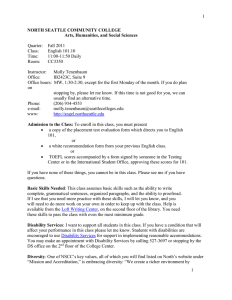ENGL&102.04: Composition II Open Knowledge
advertisement
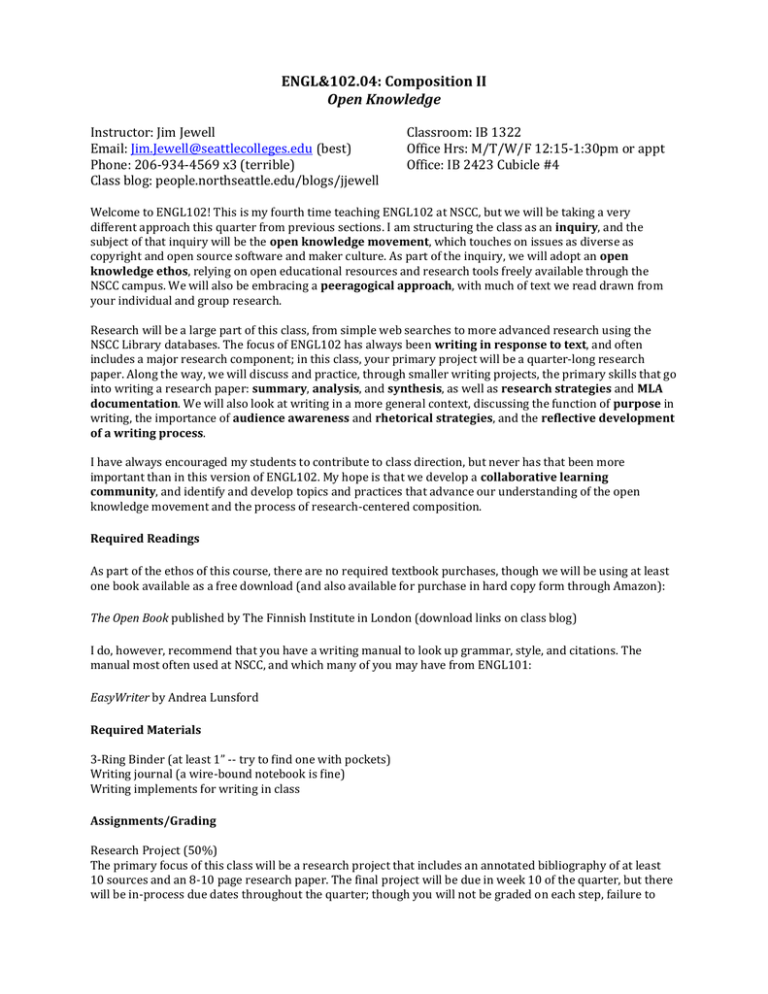
ENGL&102.04: Composition II Open Knowledge Instructor: Jim Jewell Email: Jim.Jewell@seattlecolleges.edu (best) Phone: 206-934-4569 x3 (terrible) Class blog: people.northseattle.edu/blogs/jjewell Classroom: IB 1322 Office Hrs: M/T/W/F 12:15-1:30pm or appt Office: IB 2423 Cubicle #4 Welcome to ENGL102! This is my fourth time teaching ENGL102 at NSCC, but we will be taking a very different approach this quarter from previous sections. I am structuring the class as an inquiry, and the subject of that inquiry will be the open knowledge movement, which touches on issues as diverse as copyright and open source software and maker culture. As part of the inquiry, we will adopt an open knowledge ethos, relying on open educational resources and research tools freely available through the NSCC campus. We will also be embracing a peeragogical approach, with much of text we read drawn from your individual and group research. Research will be a large part of this class, from simple web searches to more advanced research using the NSCC Library databases. The focus of ENGL102 has always been writing in response to text, and often includes a major research component; in this class, your primary project will be a quarter-long research paper. Along the way, we will discuss and practice, through smaller writing projects, the primary skills that go into writing a research paper: summary, analysis, and synthesis, as well as research strategies and MLA documentation. We will also look at writing in a more general context, discussing the function of purpose in writing, the importance of audience awareness and rhetorical strategies, and the reflective development of a writing process. I have always encouraged my students to contribute to class direction, but never has that been more important than in this version of ENGL102. My hope is that we develop a collaborative learning community, and identify and develop topics and practices that advance our understanding of the open knowledge movement and the process of research-centered composition. Required Readings As part of the ethos of this course, there are no required textbook purchases, though we will be using at least one book available as a free download (and also available for purchase in hard copy form through Amazon): The Open Book published by The Finnish Institute in London (download links on class blog) I do, however, recommend that you have a writing manual to look up grammar, style, and citations. The manual most often used at NSCC, and which many of you may have from ENGL101: EasyWriter by Andrea Lunsford Required Materials 3-Ring Binder (at least 1” -- try to find one with pockets) Writing journal (a wire-bound notebook is fine) Writing implements for writing in class Assignments/Grading Research Project (50%) The primary focus of this class will be a research project that includes an annotated bibliography of at least 10 sources and an 8-10 page research paper. The final project will be due in week 10 of the quarter, but there will be in-process due dates throughout the quarter; though you will not be graded on each step, failure to meet any of the due dates for components of the project will negatively impact the final project grade. You will be given the freedom to choose the topic for your research project, but it must touch on the open knowledge movement in some way. Homework and In-Class Writing (25%) You will regularly be assigned 1-2 page summary, analysis, and/or synthesis essays on required class readings in order to practice different aspects of the process of writing research-driven papers. The purpose of these assignments is both to develop and refine your reading and writing skills and to facilitate class discussion. I will also assign short in-class writing exercises from time to time. Class Participation (15%) Because of the peeragogical approach of this class, participation is extremely important. You are expected to attend class every day and actively participate in class discussions and peer review sessions. This grade will be based on self-evaluation and my observations about your participation. Though I will take attendance every day and expect students to attend all class meetings, attendance will not itself be graded. However, it is important to note that you can’t participate if you don’t attend; please take that into consideration. Reflection (10%) I believe reflection is the key to truly internalizing lessons, and that it is even more important when you are in a less-structured class, as I plan for this to be. You will be assigned weekly reflective activities (5% of final grade), and a final 2-page Reflective Commentary at the end of the quarter (also 5% of final grade). Grading and Late Policy Specific evaluation criteria will be handed out with each assignment. Late essays will drop 5% for every class day they are late, up to a maximum of a 10% reduction. Essays more than three days late will NOT be accepted. Late homework will not be accepted; if you know you will not be in class, you must make some other arrangement with me to get homework submitted on time. In-class writing cannot be re-scheduled without prior arrangement. Grade Ranges Above 94% 90-93% 87-89% 84-86% 80-83% A AB+ B B- 4.0 - 3.9 3.8 - 3.5 3.4 - 3.2 3.1 - 2.9 2.8 - 2.5 77-79% 74-76% 70-73% 67-69% 65-66% 64% or less C+ C CD+ D F 2.4 - 2.2 2.1 - 1.9 1.8 - 1.5 1.4 - 1.2 1.1 – 1.0 0.0 ENGL&102 Exit Standards and Learning Outcomes Upon successful completion of ENGL&102, students will be able to: 1. Read a variety of college level texts critically, including at least one full-length written text. 2. Compose coherent analyses of full-length texts. 3. Plan, organize, and write a longer thesis-driven essay about a complex idea (>5 pages). 4. Recognize and choose rhetorical strategies for academic audiences and purposes. 5. Synthesize sources and information. 6. Accurately and ethically summarize, paraphrase, and quote an author‘s ideas for the purposes of analysis. 7. Smoothly integrate source material in support of an essay‘s thesis. 8. Apply MLA-style standards and documentation to academic essays. 9. Engage in self-editing practices in order to write clear, grammatically and mechanically correct prose. 10. Use library resources for locating print and online sources not openly available on the free Internet. 11. Evaluate sources critically for authority, bias, currency, and relevance to the rhetorical situation. 12. Understand plagiarism and how to avoid it. Class Policies Attendance Class begins promptly at 10:00am, and I will often make important announcements at the beginning of class. If you have not arrived in class by 10:10am, you will be marked late. If you are late or absent, you must see me in office hours to cover the missed material; I will not answer those questions immediately before or after class. If you arrive at a peer review session without a printed copy of your current draft, you will be asked to leave and you will be marked absent. Statement on Participation Your active participation in class is expected. You should be ready to ask and to answer questions about the readings, and to make thoughtful contributions to group discussions in class. At some point in the quarter, you will b expected to contribute a reading discovered during your research to the class, and I also may ask you to write materials that will be shared with class as well. Excellent and poor levels of participation will impact your participation grades alike. If you have any questions or concerns about your level of class participation as the quarter proceeds, please see me. Essay Expectations, Grades, and Revision Work that is due should be brought to class in paper form. Only in a documented emergency will I accept homework or essay drafts via email. It is a good survival policy for you to locate several possible printer locations on campus where you could print out your work if your home printer is not working. A printer not working is not a valid excuse for missing the due date of a piece of written work and does not allow you to turn that work in late. My essay grades are final. I am happy to review my comments and the essay rubric with you, but I will not make changes to essay grades once the essays have been returned to you. Page One Writing and Language Center (formerly The Loft Writing Center Plus) Page One is the campus language lab/writing center, located on the top floor of the library. One of the primary attributes of Page One is the free tutoring! The tutoring sessions last 30 minutes, are held on a firstcome first served basis, and can help you with reading, writing, grammar, listening and speaking. Although you will not be required to use the services of Page One in order to be successful in this class, many students have found their services helpful. Instructor Conferences You are encouraged to visit your instructor during office hours to discuss any aspect of the course. I will be happy to receive feedback about the course or simply get to know you a bit better, help you wrestle with difficult texts or concepts, review and comment on rough drafts, or address any concerns you may have. Classroom Etiquette I’m happy to allow beverages in class, but in consideration of all of us, I do ask that you refrain from eating food during class. I also ask that you be sure to take your cans and/or bottles with you at the end of class and not leave them on your desk or the floor. Students who wish to use laptops during class should consult with me first and commit themselves to using their computers only for work directly associated with this course during class time. Lateness is actively discouraged: chronic lateness is disruptive, rude, and damaging to your academic success; therefore I will personally counsel students I observe to be habitually late to find another section of this course that better fits their schedules. Finally, I insist that you silence your cell phones while you are in the classroom and that you do not send or receive text messages during class. Academic Honesty It goes without saying that the grade you earn is supposed to reflect your learning. Out of fear or ignorance, students sometimes submit other people’s work as their own. To take the words or ideas of someone else and present them as your own is plagiarism and is unacceptable in academic life. The nature and causes of plagiarism may cover a range from the accidental to the dishonest. Examples of plagiarism encountered in academic writing may include the following: - incorporating into your own writing, without proper and complete acknowledgement, words and sentences from a print, electronic, or oral source - inserting longer passages (such as four or five consecutive sentences or whole paragraphs) of somebody else’s writing into your own without complete acknowledgement - paraphrasing so closely or so extensively from a source that sentences or ideas really belong to the original writer - submitting as your own entire essays written by another person or taken from a printed source or off the internet - receiving so much help from another person that the work could not honestly be called your own. Students, by their attendance here, agree to adhere to the Student Code of Conduct, which states, in part, that “academic dishonesty, to include cheating, plagiarism, or knowingly furnishing false information to the college” may bring disciplinary action. The policy of the NSCC English faculty is to exercise its professional judgment as to the nature and cause of each case of suspected or proven plagiarism and to respond in a manner suited to the case. Responses may include the following: - requiring that a piece of writing be revised to eliminate the plagiarism - denying credit for a piece of writing in which the plagiarism has been found - recording a ‘0’ grade in the student’s class record for the project, thereby - lowering the student’s final grade. Because the papers we write in this class require multiple drafts, plagiarized papers typically do not go unnoticed. When I have encountered plagiarized papers in the past, my policy has been to record 0 points on that assignment and to file a formal report with the college requesting disciplinary action. ‘Warnings’ are typically not given, even for first or unintentional offenses. Disclosures Reasonable accommodations are available for students with documented disabilities. Students should contact Disability Services (located in Student Success Services in the College Center building) to discuss their accommodation needs as soon as possible. Students who are registered with Disability Services and receive accommodations should notify me as soon as possible to avoid any delays in implementing those accommodations. Student who are not already registered but may be eligible due to a documented disability should visit Disability Services (located in Student Success Services in the College Center building) to discuss accommodations. Student Responsibility I value student responsibility above all else. I will always strive to provide as much support as each of you needs, but it is your personal responsibility to turn work in on time, to ask questions if you are unclear, and to seek help when you need it. I am far more likely to make exceptions to rules if you approach me before they become an issue, and encourage you to take ownership of your education in every way.
